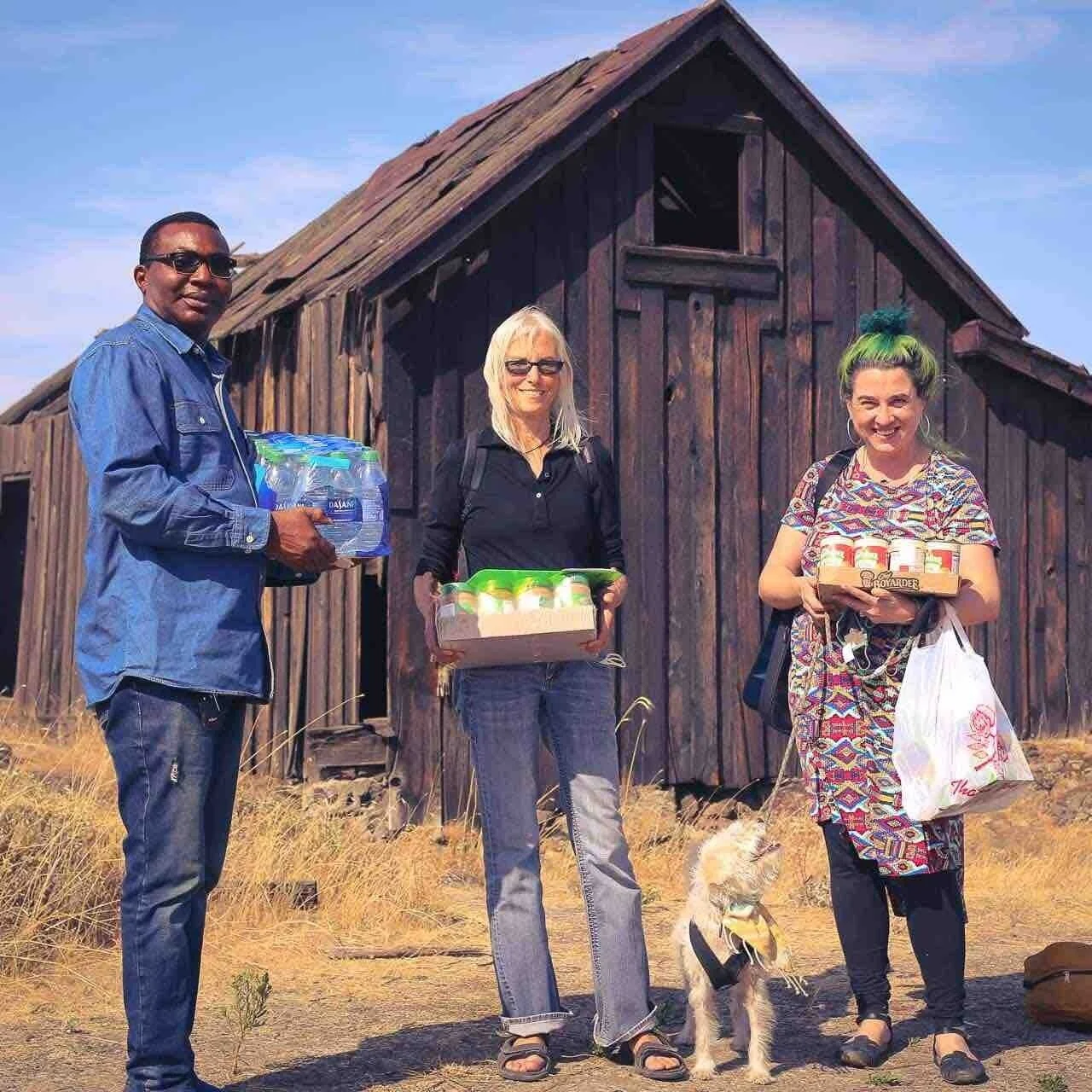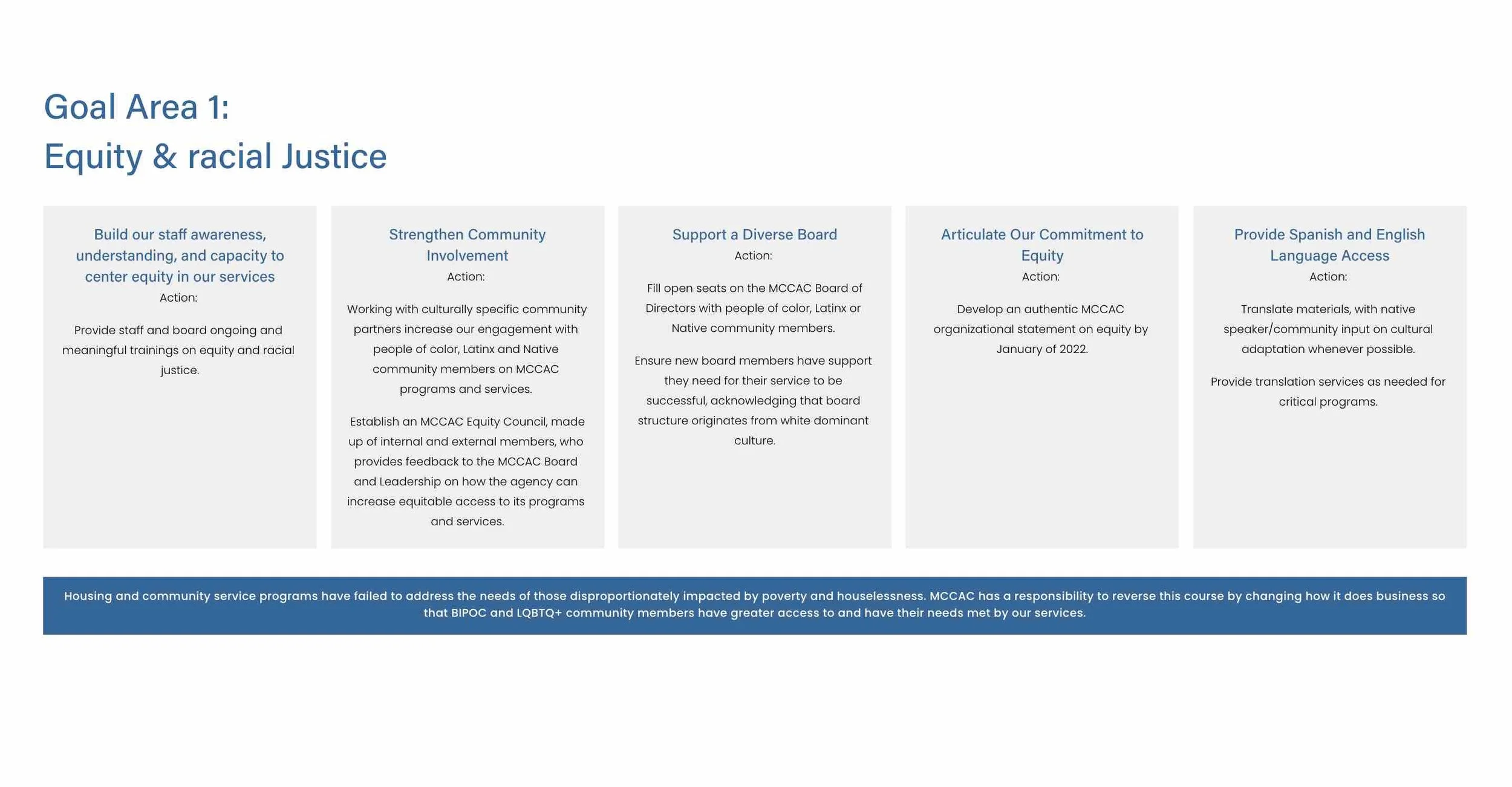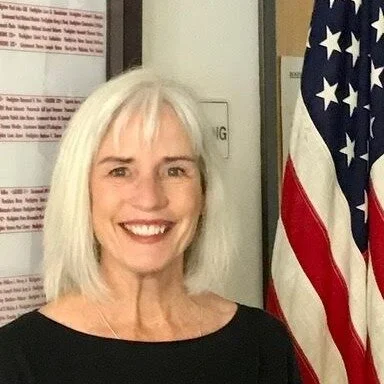MCCAC Strategic Plan Details A New Era for Housing, Utility and Houselessness Assistance in the Mid-Columbia
Walking into a new era of work in the Mid-Columbia region. Pictured: Part of the MCACC outreach team
Photo Credit: Robbie Denning
By Cole Goodwin
Mid-Columbia Community Action Council, housing, shelter, utility and weatherization assistance services provider and regional coordinator of the homeless service system, is ushering in a new era with a new logo, new website, new leadership and a new 4-year strategic plan. The new look, feel, and web-based infrastructure are envisioned to bring a “bright, equitable, and dignified future for our community and our organization where our community thrives, our partnerships expand and deepen our impact and our staff are empowered and supported to do their best work”.
MCCAC’s new look is a part of their plan to continue to grow their leadership in the region and bring money into the region to address housing issues. MCCAC has brought millions of dollars to the community to support housing-related services including $3.1 million to address houselessness and $1.5 million to build a Navigation Center in The Dalles. MCCAC has created 16 new jobs within their organization and helped transition over 25 people experiencing houselessness into permanent housing since November.
Strategic initiatives included in the plan are racial and equity trainings for board and staff, a regional coordinated entry system, and the redevelopment of the Hamilton Apartments on west Second Street in The Dalles.
The Hamilton Apartments initiative would transform the apartments into a thoughtful permanent supportive housing project. The apartments currently serve 10 formerly houseless veterans and their families and could house more veterans and houseless community members should MCCAC be able to successfully secure funding for the development.
“We have plans to increase the number of units that will serve formerly homeless veterans there,” said Kenny LaPoint, MCCAC Executive Director “We plan to redevelop the space so that it is dignifying for the residents and helps them envision what it is like to successfully reintegrate into the community.”
LaPoint said that the redevelopment would adhere to top of the line design and housing quality standards and would bring peace and serenity for clients who had experienced historical trauma and/or marginalization.
A new logo for a new era.
New Logo Reflects Strong Local Identity
The new logo gives a clearer picture of what services are offered by the MCCAC and helps create a localized identity. (Previously MCCAC had utilized the Community Action Council’s national logo.)
“I felt like it was important for Mid-Columbia Action to have its own identity and we had a lot of change going on at the agency,” said LaPoint, “The new logo highlights that we’re in a different era of work for our agency.”
The new logo was chosen by a vote from the Board of Directors and MCCAC staff.
“We wanted the work we do to be visually represented in the logo,” said LaPoint, “The roof represents equity, and it overarches all of our programs. It is embedded in all our work. We always need to consider equity or inequity, when it comes to our work. We need to do outreach, and we also need to evaluate existing policy and future policy and ensure that we are not creating systems that are disproportionately impacting people of color or create access barriers.”
Arching even bigger over the top of it are the values of the agency “Equity, Compassion, Collaboration, Community, Respect” which were the mutually agreed upon values that staff and the board of directors hashed out during their strategic planning sessions.
“Whenever we’re having trouble making a decision about an individual situation, a policy evaluation, or a piece of work that we're doing, then we can point back to our values and let values drive the work,” said LaPoint.
The icons within the house represent MCCAC’s programs energy and utility assistance, weatherization, housing, and shelter assistance.
“We help people pay their water bills, we help people heat their homes, and MCCAC helps people keep the lights on,” said LaPoint.
The new web-based infrastructure is welcoming and inviting and will bring better accessibility to services rural Mid-Columbia region.
The New Website
MCCAC has also launched a new website that will provide clients with updated information about their programs and the web-based infrastructure they need to have greater ease of access to MCCAC services. The implementation of the new web-based infrastructure is a strategic shift for the agency to address the unique challenges facing MCCAC programming due to its rural location and the COVID-19 pandemic.
“We’re creating easier access for rural community members so they don’t need to come into the office for everything,” said LaPoint.
The new website allows users easy access to energy, utility, weatherization, rent, veteran housing assistance, and shelter assistance programs. Users can now apply for assistance, schedule appointments, and download printable forms online. The site is also available in both English and Spanish.
Pictured: MCACC Outreach team members
The New Era
MCCAC’s new strategic plan titled “A New Era” led by overarching goals of equity and racial justice is bringing the organization into a new era of work in the Mid-Columbia region. The plan outlines several goal areas including equity and racial justice, community relationships, housing stability, and homelessness services, and organizational health and infrastructure.
The plan was developed in consultation with multiple community partners, stakeholders, MCCAC staff, and its Board of Directors and incorporates community-wide data sets to help inform strategy and direction that match up with community needs.
Fourteen large organizational stakeholders were asked a number of questions before strategic planning began. Stakeholders were asked what the top needs in the community are, what MCCAC’s role in meeting the need should be, how MCCAC could help their agency achieve their goals, how agencies could work together to achieve mutual goals, and what opportunities there were for collaboration between organizations.
A major theme MCCAC came across in stakeholder's interviews was a need for leadership in paving a way to ending houselessness in the Mid-Columbia region. MCCAC was identified by several stakeholders as being in a unique position to fulfill this leadership role, as the primary recipient of homeless service funding to convene and coordinate collaboration amongst those working in the homeless service system.
“One of the things that rose to the surface was that there needs to be an agency that takes the leadership role on homelessness and MCCAC should be that agency,” said LaPoint. “Being a leader in the area means stepping into some areas that may pose some risk, but when you’re the right organization to do that you take that risk. We did that by taking over the Pallet Shelter in The Dalles. I didn’t plan on taking on a shelter in my first year here, but if not doing that was going to result in people not having shelter, then I had to set aside my preconceived plans and step into that role.”
LaPoint also clarified for CCCNews that since taking over the shelters they have made it a requirement of residency that all clients staying at The Dalles Pallet Shelters be working towards acquiring permanent housing. MCCAC of course, has provided support in helping clients access programs that can get them into permanent housing.
MCCAC has also stepped into the leadership role by providing funding to The Next Door, and also fully funding Hood River Shelter Services for the winter of 2021.
“Hood River Shelter Services is now able to go to a 24-hr 7 days a week model whereas before they were operating during nights only,” said LaPoint.
The other major theme brought up by collaborators and community partners was the need to work together with “clear consistent communication to create a strong network of culturally responsive providers.” LaPoint emphasized that although MCCAC would be taking a leadership role, addressing houslessness in the region was a team effort.
“Homeless prevention services is something that MCCAC has historically taken on, but in my opinion the Mid-Columbia Housing Authority was well positioned to do that work and we’ve partnered with them to make that happen. They’re running the Oregon Emergency Rent Assistance Program, and two other programs and as a result we’ve gotten nearly 3 million dollars out to the community” said LaPoint.
“MCCAC does not need to do it all, but we will do our best to financially and publically support it when possible,” said LaPoint, “Homelessness comes with a lot of public perception and our community partners and ourselves have to deal with that on a day to day basis. So we’ll stand behind our partnering organizations as they take on that work. We want to build a better community because we think we can and we think our community deserves better, but in order to do that we have to collaborate,” said LaPoint.
Collaboration between organizations also makes for a better more client-centered approach to providing services to the community.
“Typically, clients are not just served by one organization. They are served by many organizations and are impacted by multiple systems,” said LaPoint “We need to collaborate across systems in order for our clients to be successful. The way I think of things is what is the impact to the client? So collaboration and community relationships are important because it makes for a better client experience and better client services that foster success.”
MCCAC will also be supporting the implementation of a coordinated entry system to houseless services in the gorge. Coordinated entry is a web-based platform that allows multiple agencies to allow release of information about a client across agencies in the region so that clients being served by multiple agencies don’t have to fill out multiple applications for services they may qualify for, and it allows agencies to better exchange and share information to ensure clients don’t fall through the cracks.
“We will be supporting the coordinated entry system in it’s full operation across the region. We have stood up a coordinated entry staff that is supporting our community partners in implementing coordinated entry across the region,” said LaPoint. “It allows us to take a regional approach to homelessness services. Clients often cross county lines, but even if they move, they should still be able to access services with the greatest amount of ease, and that’s what coordinated entry does,” said LaPoint.
Stakeholder's other main concerns were identified as lack of housing, a need for services related to affordable housing, including behavioral health, weatherization services, and utility assistance.
“Today we find ourselves in the midst of multiple crises; COVID-19 has wreaked havoc on our communities resulting in our most economically fragile friends and neighbors being left out in the cold. This has been compounded with a housing crisis that has been years in the making; rising rents and overall lack of available and affordable housing has resulted in increased houselessness and the complete destabilization of our most vulnerable community members. While our current reality has proven trying, Mid-Columbia Community Action Council (MCCAC) has entered a new era and is poised to lead our communities toward the bright, better future that awaits,” said LaPoint.
“We continue to make equity and diversity a priority in our hiring and board appointments. We know our plan will be only as effective as the energy and accountability we apply to our work. For that reason, we will be stepping forward with intention in how we remain accountable, measure our progress, and adapt to meet new demands and opportunities,” the plan states.
“The plan is aspirational but with the social capital and strong collaborative relationships in the Mid-Columbia Region, it is achievable,” said LaPoint “As we embark on this plan, I implore you to join us in our work to address some of the most complex challenges that our communities are facing. For this plan to be successful, we need the entire Mid-Columbia community to recognize the value we bring as a whole. It is through the power of a unified community that we will help make our community a better place. A place where houselessness is a thing of the past and where our most vulnerable community members are anchored in stability, and all are provided with opportunities for success,” said LaPoint.
Donate to MCCAC.
Meet the MCACC Team
Part of the MCACC Outreach Team. Photo Credit: Robbie Denning
MCACC’s 2021 Board of Directors
Joan Bird, Chair-Sherman County (elected official)
Amy Asher, Sherman County
Kari Pinkerton Silcox, Sherman County
Kathy Schwartz, Wasco County (elected official)
Scott McKay, Wasco County
Andrea Mejia, Wasco County
Arthur Babitz, Hood River County (elected official)
Marianne Durkan, Hood River County
Sarah Kellems, Hood River County
MCCAC Outreach Team
Karen Shultz, Outreach Team Member
Joseph Rankin, Outreach Team Member
Meet Kenny LaPoint, MCACC Executive Director
Pictured: Kenny LaPoint Photo Credit: Robbie Denning
Kenny LaPoint has been in the nonprofit and social service industry for almost 20 years. He started by running a homeownership counseling center in the Bend area called NeighborImpact, a community action agency that serves Deschutes, Crook and Jefferson County, and the Warm Springs Reservation. He’s been the housing and resident services director for Housing Work, the central Oregon housing authority, where he ran a federal housing voucher program that used to be called Section 8. He also oversaw the region's Homeless Services Continuum of Care, which was a collaborative of all homeless service providers in Deschutes County, Crook and Jefferson County, and Warm Springs.
LaPoint and a few of his friends also started a grassroots organization called Icon City. Icon City was the first organization on the West Coast to run a shower trailer for the houseless. Icon City also set up a text helpline where they could send needs requests to the community, and the community would respond to those needs by sending a message back.
“It was a regulated text line, it wasn’t a group of friends or a group test, but people who signed up would get a text every Thursday,” said LaPoint. “We would coordinate the pickup and delivery of needed items.”
LaPoint said the text line was a big hit in the community.
“We sent a text out saying we need those little small green propane tanks to give to folks who are camping, so they could use them for their heaters to stay warm. And I ended up getting a response from somebody who said he was going to call a few vendors and get back to me. He ended up calling me back and said ‘Hey, I called Ace Hardware and asked them for propane, and I told them what I was doing it for, and they said they would match my contribution, and I ended up with 500 propane tanks…’ I had to go pick them up and so I was driving a truck around with 500 propane tanks but we did, we used the text line a lot with the school district who worked with homeless kids,” said LaPoint.
One of Kenny’s biggest influencers and the reason for the way he does his work is his son. When LaPoint’s son was 9 years old he was diagnosed with Type 1 Diabetes.
“It really changed the way I looked at people experiencing homelessness and how health conditions can impact them. Being homeless and having a health condition causes health conditions to be exacerbated. And I could see how impossible it would be to manage insulin if you’re experiencing homelessness because the insulin has to stay at a certain temperature, it can’t freeze, it can’t get too hot. If either of those things happens it’s no good,” said LaPoint, “And if it’s no good and you use it, you end up in the emergency room.”
“I started doing a lot of cross-sector work with the CCO (Coordinated Care Organizations) in the region, I was on their advisory council, I wrote health and housing initiatives, and eventually the State of Oregon’s Housing Agency asked me to come work for the them to do cross-sector collaboration work statewide, and that’s when I transitioned from Central, OR to the valley and worked in Salem for six years,” said LaPoint.
“I started as this person doing cross-sector collaboration and ended up becoming the Public Affairs Director of Oregon Housing and Community Services, which is the primary funder of homeless services and the state housing finance agency,” said LaPoint.
While working in Salem, LaPoint remained an advocate for rural communities. “I reminded our elected officials and our state administrators that a one size fits all policy doesn’t work when you are considering the needs of both rural and urban areas of the state. I was always reminding the state that we need to consider the needs of rural Oregon. I always wanted to make sure we were hearing the voice of rural Oregon and considering how policies and funding structures impact rural Oregonians' ability to take advantage of them.”
LaPoint said he loves living in the Gorge and working at MCCAC. He is looking forward to being a part of a team paving the way for better housing services in the Mid-Columbia region.
"I've been given a lot of good things in life, and I feel like I have a responsibility to pay it forward," said LaPoint.









